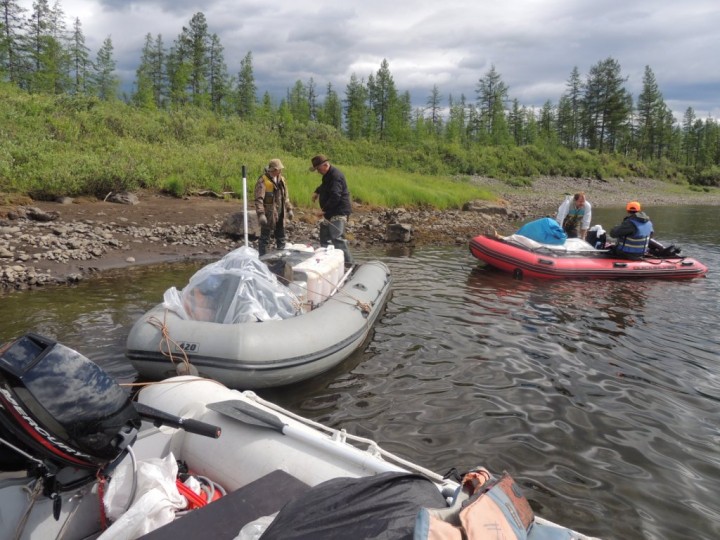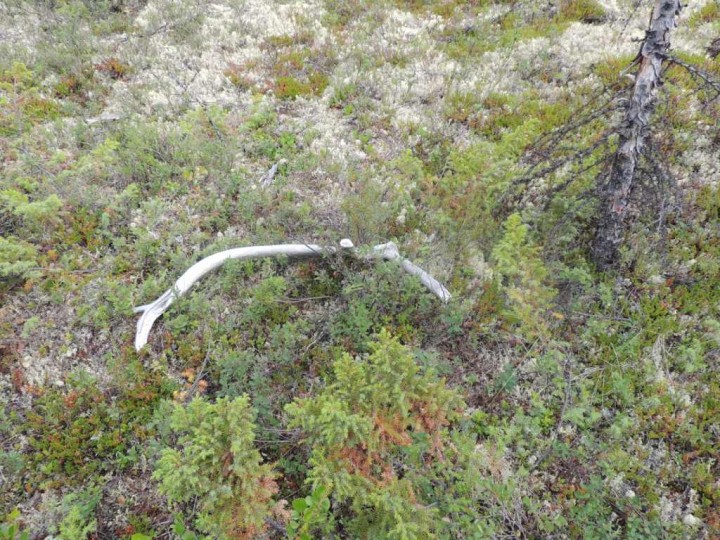Embenchime River 66.15 N 97.57 E
73°F High 40°F Low Periods of rain and strong wind
11:50 p.m. Siberia 11:50 a.m. Eastern Daylight Time
From Dr. Ranson:
It is near midnight, and we just got off the river. I helped get us situated and safe, but then left the others so I could check in. Dinner is cooking, and it smells fantastic. We don’t always eat regular meals here – but when we do get our supper, it is very welcome.
I realized just a few minutes ago that today is Friday the 13th. In America it’s considered an unlucky date. Many people might say, probably half-jokingly, that it is no time to travel or take risks. Well, although I’m not superstitious, I have to admit that this was not the luckiest day to run the river. No one is hurt, and there were no tragedies. But we struggled with this river today.
The day started beautifully. A bright, warm morning after a crisp, chill night. We ate fried pike and bread for breakfast, then broke camp. We took down the tents, packed all the gear, and then loaded our three boats. We don’t have excess gear – but you can’t say that we pack lightly.
Our goal for today was to reach the next camp, 39 kilometers down river. That’s nearly 25 miles – a good day’s trip. However, that was 39 kilometers “as the crow flies”. Crows have the common sense to fly in a straight line – but the Embenchime apparently has no sense. It twists and turns all over the place. Following the river, we had to travel around 60 km (37 mi) or more to reach the next camp. We didn’t quite make it. We’re camping riverside at least 15 km short of plan.

The convoy of boats which carries the scientists down river. The boats travel tied together, one after another in a line. The lead boat is motorized. The second carries the gasoline, cargo and a passenger or two, and the rear boat carries cargo and passengers. Ross and Guoquing board the rear boat, while Slava and Pasha work on the ropes.
The long distance didn’t thwart us – it was the river depth. The Embenchime is about 150 feet wide, and supposed to run 2-3 feet deep. However, the water level is very low. In many spots the rocks were just a few inches under water. Sometimes we could motor along, but often – way too often – we had to get out and pull our boats over the rocky shallows. When we get our weight out of the boat, the boat is lighter and floats higher. With some luck and a lot of work, we were able to pass all of the riffles.
When we found deeper water, I thought it would be relatively restful. But not today. When we are under power, Slava and I sit in the lead boat, with all the rest of the boats tied together in a line. We are like the mother duck, with our two ducklings following behind, one after another in a nice little row. Unlike a mother duck, however, the lead boat is not very mobile. The motor provides power, but under such weight it isn’t very effective at steering. So the guy in the front of the boat – that’s me – gets to act like a human rudder, and steer the boat. In deep water, sometimes this is just a pleasant ride with a little push here and there. But on the shallow Embenchime, it was constant work – paddle left, paddle right, we have to hit that deep channel just right, and we have to miss those rocks! It was quite a workout.
Not that I’m complaining – it’s just how it goes. Slava provided all the steering the motor had in it, and we needed him to run that motor. We all have our own work to do. All I can say is… I’m sure I will sleep soundly tonight.
I’m definitely in a carb and calorie burning mode right now. We’re eating high protein fish dinners, with just a few carbs and a lot of exercise. The Embenchime River Diet sure packs a punch! That reminds me, though – Ross was back in the third boat today. No frantic paddling for him. After today, I think I have a leg up on our weight-loss challenge!
After we’d worked hard to free ourselves of the shallows, and were finally motoring forward relatively well, Slava and I noticed something disturbing. Our boat was taking on water. We weren’t sinking, but we sure had a leak, no doubt from dragging the boat over the sharp rocks in the shallows. The lead boat carries gear that should stay as dry as possible, so we couldn’t keep going. We pulled over, pulled the motor off our boat, and switched it to a sounder boat. Our leaky boat became a cargo boat (most of the cargo can stand getting a bit wet) and after all of that, we were underway once more.
Unfortunately, it wasn’t too long before we noticed water in this boat, too. It had also been damaged, and now was leaking. Once more, we had to switch boats, move the motor, move the cargo, and repack. We couldn’t take time to make repairs – we were too far behind schedule. That meant the cargo, as well as Ross, Pasha, Guoqing and Sergei, would have to ride wet today.
Luckily, we finally found a good spot to make camp tonight. It’s a gravel bar on the river. The stones are smaller in diameter her than our first camp, so I think it will be more comfortable sleeping. The light is very soft right now. The sun went down at 11:20 p.m. It’s after midnight now, and I can still see the sun shining on the hills to the east. Here, in camp, we are in dusky shade. I don’t think it gets darker than this… and it is still light enough that I could read a newspaper. It’s the land of the almost-midnight sun.
Usually the days on the river are the days we can rest and regroup. It’s a time to observe the forest biomes on the sides of the river. And a day of contemplation, too – a time to think about what we’ve seen, what it all might mean. Today, however, there was not much time for thinking, and not much time for observation.
In the quieter times, I was able to notice my surroundings. For example, I found myself noting that my horde of mosquito friends was fairly thin. Don’t get me wrong – there are plenty of mosquitoes here, for sure. But not the overwhelming thousands clinging to everything that I’ve come to expect in this region.
There continues to be more mammal life on this river than we’ve seen elsewhere, in years past. Today we saw a cow and a calf peacefully sharing a long drink from the river. An agitated bull moose pranced back and forth on the bank as we passed by – as if he didn’t know whether to hold his ground or run off into the woods. While he was showing off, a beautiful eagle flew overhead. It was very big, with a solid white tail. I understand that there are several types of eagle that live in northern Siberia, including the White-tailed Eagle. I suspect that is what this was, because it had a very huge wingspan, and the White-tailed Eagle not only has a white tail, but it is said to be the largest eagle in the world.
The forests are still all larch. We see some areas that have been burned in the past and have lots of young trees, but no recent fires. There are a few trees leaning here and there, and a few banks have collapsed. These things happen when permafrost – the permanently frozen soil that lies a meter or so under the groundcover in Siberia – thaws. We’ve seen a few small signs of random thawing, but nothing wide scale.
Yesterday I came across a few juniper plants near camp. I picked a branch, and put it in my pocket. Apparently some of the locals in Russia believe that burning the juniper and letting the smoke go through your vehicle gives safe travel. We didn’t burn any this morning, but maybe we should have tried a little Russian superstition to be a counter to the American Friday the 13th superstition? Maybe we can try tomorrow morning.

An very old antler, probably from an elk, lying in ground cover next to juniper. It is said in some parts of Siberia that burning juniper, and sending the smoke through the vehicles, helps make the journey safe. After the arduous day on the river today, the team may be tempted to try this ritual before departing on tomorrow’s river journey.
Ah, I was called to supper, and I had to pause. I wasn’t about to miss out on this meal – it’s been a very, very long time since lunch. And will be a long time until breakfast. In honor of the hard day’s work, we had canned beef with spaghetti noodles and tomato sauce. Cow and carbs. It was quite good, and I think we all feel better now.
It’s now after 1:00 a.m., July 14, here. We’ve finished most of our work, and everyone has a few free minutes. Ross has gone to his tent. Guoqing is taking photos, and Slava is taking photos. It’s a spectacular night for pictures. There is a wispy fog rising from the river, and the light is dim. As the fog winds around the tents and trees, it appears quite striking. I am relaxing and sharing today’s story, which is still work, but not too painful. Sergei and Pasha – well, I guess they aren’t relaxing. They are repairing the holes in the boats.
There is still work to do before I sleep, so I will sign off for now. The plan tomorrow is to get up, repair the boats, then get downriver to the camp we’d planned to reach today. If we get in early, we can start our measurements. That is our goal.
At dinner we talked about the river – the challenges this river has given us today were amazing. Slava says it took us 10 hours to travel 40 kilometers. We need to speed it up. We have about 440 kilometers left to reach Tura. At this rate, we might get there by Christmas! The river should deepen tomorrow, and even more as we near the Kochechum. It’s usually not so difficult. However, this has been a very dry spring, following a very dry winter. There has been almost no rain and little snow. Without snowmelt and without new rain, the rivers can’t help but run low.
Did I mention that we fought a strong storm that came up today? It poured rain for a time, but no lightning, so we were safe on the river. But the wind blew very, very hard from the south. It overpowered our motors and actually pushed us upriver! I think that was the worst moment of the entire trip. After struggling so hard to get downstream, to lose ground so quickly was frustrating. The storm passed, and we made it to this camp, all in one piece. The Embenchine is relatively small, but she has gained our respect.



